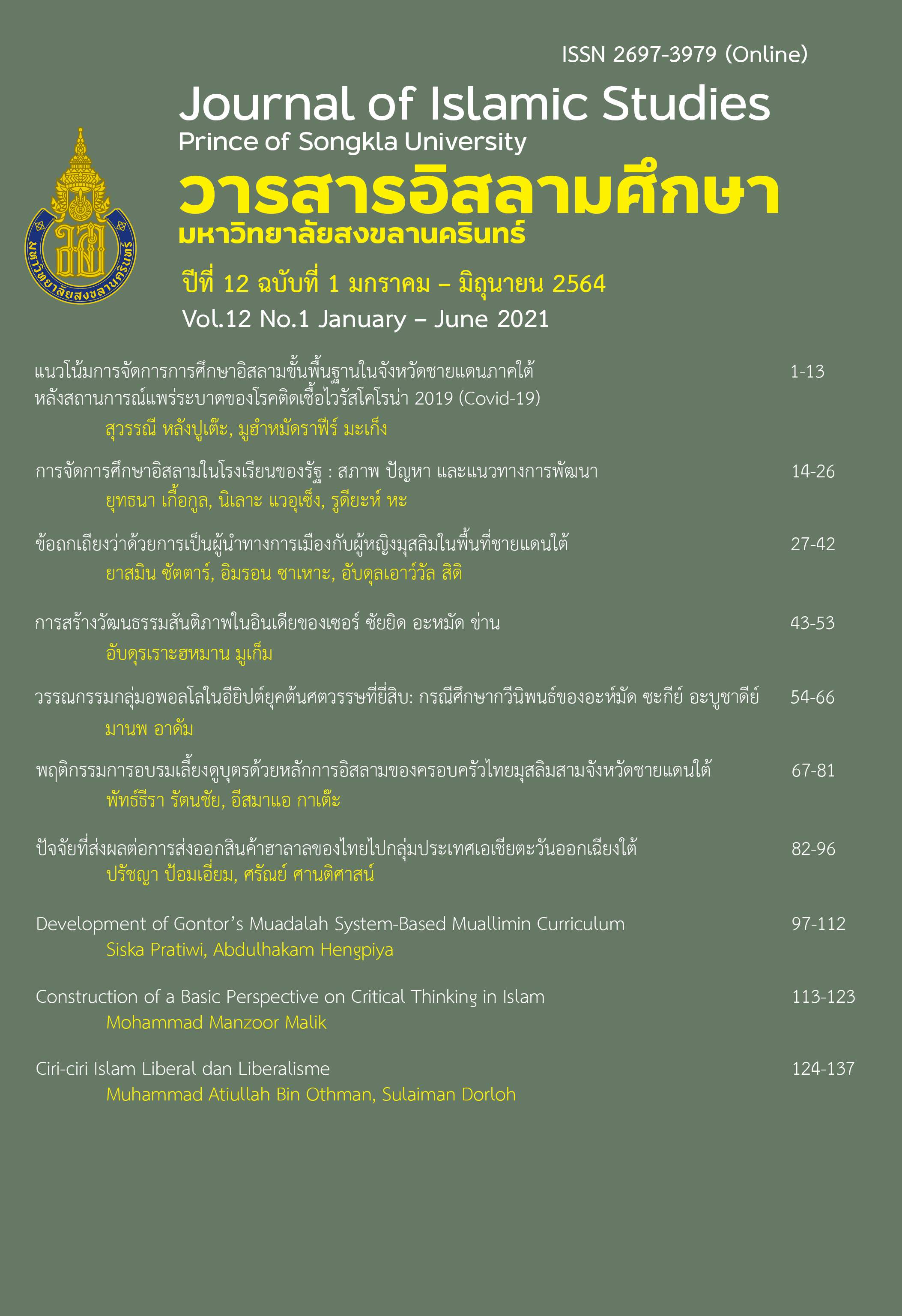Debate on Political Leadership and Muslim Women Politicians in the Deep South of Thailand
Keywords:
Women, Melayu Muslim, Political Leader, Deep SouthAbstract
Objective This article is a part of the research on Formal Politics of Melayu Muslim Women in the Deep South: Roles, Opportunities, and Challenges. This article aims to discuss about leadership of Muslim women with the case study of Melayu Muslim women in the Deep South.
Methodology This is a qualitative research which has conducted through document reviewing and interviewing of Melayu Muslim women politicians in the Deep South.
Research Findings The result found that in the Deep South of Thailand, main challenge for Muslim women to participate in politics is the debating issue regarding to the women’s roles as state’s leaders. Muslim lawyers and intellectuals in the past interpreted this point differently in accordance with the norms and the cultures in each context. Some Muslim scholars did not see that the roles of woman as a leader either ministers or prime minister is contradicted to Islamic principles if that woman could observe and fulfill other Islamic principles which woman has to follow. Apart from that, in the deep south, most of people do not accept the role of woman in politics which affect to the woman politicians though she may have more supported factors, it is hard for her to win in the election in many boroughs.
Applications The finding was discussed with the women representative and civil society organizations in the Deep South and contributed to their projects to empower Deep South’s women.
References
al-ʿAsqalānī, I. (n.d.). Al-Iṣābah fī Tamyīz al-Ṣahābah [The morning in the company of the companions]. n.p.
al-Baghdādī, A. (1980). Al-Faqih wa Al-Mutafaqqih. n.p.
al-Bukhari, M. (1944). Sahih al-Bukhari. n.p.
al-Jawziyya, I. (1987). Zad al-Ma'ad [Provision of the hereafter]. n.p.
al-Qaradawi, Y. (1997). Min fiqh al-dawlah fī al-Islām. Dār al-Shurūq.
al-Sallabi, A. (2014). Barlaman fi al-Dawlah al-Hadithah al-Muslimah. Dar ibn Kathir.
al-Zuhayli, W. (1985). Al Fiqh Al-Islami wa Adillatuhu [Islamic Jurisprudence and its Proofs]. n.p.
Azizah, W. (2002). Women in Politics: Reflections from Malaysia. International IDEA, 191-202.
Binji, A. et al. (2015). pā tānī prawattisāt læ kānmư̄ang nai lōk malāyū [Patani History and Politics of Malay people in Malay World]. Islamic Culture in South Foundation.
Bundhuwong, C. (2017). Religious Life and Status and Role of “Kampong Women” in a Melayu-Muslim village of Southernmost Thailand. Thammasat Journal, 36(3), 217-241. http://tujournals.tu.ac.th/thammasatjournal/detailart.aspx?ArticleID=2863
Buranajaroenkij, D., Suwanbubbha, P. & Yimyong, M. (2017). Women at a Periphery of the Deep South Peace Process: A perspective of Female Victims of Violent Conflict. Journal of MCU Peace Studies, 5(1), 14-27. https://doi.org/10.14456/jmcupeace.2017.2
Chindaphrom, S & Kaewkrong, C. (2013). Political Participation of Thai Women in the Western Local Government Area. Journal of Politics and Governance, 3(2), 118-133.
Civic Women. (2012). sīang khō̜ng khwām wang: rư̄ang lao phūying phư̄a krabūankān santiphāp chāidǣn tai [Voice of Hope: Stories of Women for Peace Process in the Deep South]. Pattani: Project of Women Civil Societies under the Project of Food Security and Jobs for Men and Women in the Deep South of Thailand.
Eoseewong, N. (2007). malāyū sưksā: khwāmrū phư̄nthān kīeokap prachon chonma lāyū Mutsalim nai phāk tai [Malay Study: Introduction to Malay Muslims in the South]. Amarin Press.
Karaman, H. (1997). Modernist Proje ve İçtihâd, İslam ve Modernizm ‘Fazlurrahman Tecrübesi’. Istanbul Metropolitan Municipality Cultural Services.
Local Development King Prajadhipok's Institute. (2008). sattrī kap kānmư̄ang : khwāmpen čhing phư̄nthī thāngkān mư̄ang læ kān khapkhlư̄an [Women and Politics: Fact, Political Space and Mobilization]. King Prajadhipok's Institute. Retrieved from http://www.kpi.ac.th/media_kpiacth/pdf/M10_184.pdf
Manochanphen, N. (2018). pœ̄t sathiti phūying kap phư̄nthī nai kānmư̄ang lōk [Open the women in world’s politics statistics]. Retrieved from https://thestandard.co/women-in-politics/
Marddent, A. (2017). Women political participation in peacebuilding in Southern Thailand. Al Albab, 6(2), 229-246. https://doi.org/10.24260/alalbab.v6i2.861
McCargo, D. (2015). Tearing apart the land: Islam and legitimacy in Southern Thailand. Cornell University Press.
Pluemjai, S. & Sungkhara, U. (2015). Peace Development in Southern Border Provinces: The Women’s Story. Journal of Humanities and Social Sciences, Thaksin University, 10(1), 225-243. https://so02.tci-thaijo.org/index.php/HUSOTSU/article/view/43627/36060
Pongwech, M. (2001). nǣothāng kānsāng krasǣkhwām samœ̄phāk rawāng ying chāi [Approaches to Promote Gender Equality between Male and Female]. Gender and Development Research Institute.
Ramli, R & Hassan, S. (1998). Trends and Forms of Women's Participation in Politics. In Sharifah Zaleha Syed Hassan (Ed.), Malaysian Women in the Wake of Change (pp. 88-104). Gender Studies Programme, Universiti Malaya.
Sahoh, I & Sattar, Y. (2020). phonlawat kān khlư̄anwai khō̜ng nakkānmư̄ang malāyū Mutsalim thāmklāng khwāmrunrǣng nai phư̄nthī chāidǣn tai [Dynamic of Melayu Muslim Politicians’ Movements amidst the Violence in the Southern Border Provinces of Thailand]. Thailand Science Research and Innovation Fund.
Salae, H. (2010). Muslim Women amidst Conflict: The transition from victims to peace activist. (Master dissertation). Chulalongkorn University.
Salae, Y. (2012). phūying nai ʻItsalām [Women in Islam]. in Ali, I., Japakiya, I, et al. (Eds.). ʻItsalām kap khwām thāthāi nai lōk samai mai mummō̜ng čhāk nakwichākān chāidǣn tai [Islam and Challenges in the Modern World: Perspectives from Deep South’s Scholars]. Social Research Center Chulalongkorn University.
Satha-Anand, C. (2008). phǣndin čhintanākān: rat læ kānkǣkhai panhā khwāmrunrǣng nai phāk tai [Imagined land: Solving southern violence and the state in Thailand]. Matichon.
Settamalinee, S. & Binlateh, W. (2014). khon num sāo Mutsalim kap lōk samai mai [Young Muslims and Modern World]. Social Research Center Chulalongkorn University.
Shaham, R. (2018). Rethinking Islamic Legal Modernism: The Teaching of Yusuf al-Qaradawi. Brill.
The Inter-Parliamentary Union. (2019). Women in National Parliaments. Retrieved from http://archive.ipu.org/wmn-e/classif.htm
The Inter-Parliamentary Union. (2020). Women in National Parliaments. Retrieved from https://www.ipu.org/resources/publications/infographics/2020-03/women-in-politics-2020
Women and Youth Studies Project Thammasat University. (2000). "phūying kap khwāmrū [Women and Knowledge]. In the 1st Conference on Women Studies of Thailand. Thammasat University.
Downloads
Published
How to Cite
Issue
Section
License
Copyright (c) 2021 Journal of Islamic Studies, Prince of Songkla University

This work is licensed under a Creative Commons Attribution 4.0 International License.
All articles Published in The Journal of Islamic Studies are author’s opinions, and not the responsibility of the Faculty of Islamic Sciences nor the editorial board. However any citation should be referred to the journal.
















